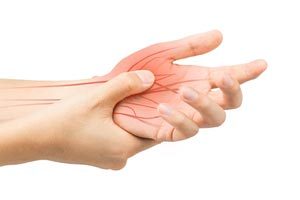What Does Nerve Pain Feel Like? Find Out If You Are Experiencing Nerve Pain
 Nerve pain is often described as a stabbing, prickling, burning, tingling or a sharp shooting pain. Like any other type of pain, the severity of nerve pain varies from mild to debilitating. Nerve pain can be caused by a wide range of things, such as irritation or nerve damage. To treat nerve damage, it’s important to find the underlying cause.
Nerve pain is often described as a stabbing, prickling, burning, tingling or a sharp shooting pain. Like any other type of pain, the severity of nerve pain varies from mild to debilitating. Nerve pain can be caused by a wide range of things, such as irritation or nerve damage. To treat nerve damage, it’s important to find the underlying cause.
The nerves that run all throughout your body oversee sending sensations to the brain, including pain. Pain is important because it keeps you safe. For instance, when you touch a hot stove, your nerves alert your brain to pain, and you move your hand before more serious damage can take place. Nerve pain takes a sinister turn on this relationship by sending pain signals to your brain for no reason at all. In short, your nerve sends a pain signal to your brain, your brain reacts by making you feel pain, but there’s no obvious answer as to what’s causing the pain.
So, what makes your nerves go haywire? Most of the time, the cause is related to an injury or disease. For instance, a herniated disk in your spine can press against a nearby nerve, causing shoulder, arm, or leg pain, depending on the location of the nerve.
Nerve pain is often accompanied by one or more of the following symptoms:
-Partial or complete numbness
-Weak muscles
-Paralysis
-Muscle atrophy
-Skin looks or feels different
-Depression
-Anxiety
Technical Classifications for Nerve Pain
In general, there are three different classifications for nerve pain regarding when and how it strikes.
–Allodynia: You feel pain when doing things that under ordinary circumstances would not cause pain.
–Hyperalgesia: You feel severe pain when doing something that should provoke only mild discomfort. For instance, lifting very light weights might feel like you are lifting 200-pound weights.
–Dysesthesia: Your pain is sudden and spontaneous, it comes without warning and is not provoked by any activity.
What Causes Nerve Pain?
This is often the most difficult question of all. Your doctor will discuss all your symptoms with you and conduct some in-office tests to determine the cause of your nerve pain. Diagnostic testing may be necessary to see what’s going on inside of your body.
If you are having troubles diagnosing nerve pain, you should see another doctor to get another opinion. Unfortunately, it can take months to get an appointment with a specialist for nerve pain, and in the meantime how are you supposed to cope with the pain? That’s where we come in, offering same-day medical treatment from our experienced in-house doctor.
Some common causes of nerve pain include:
-Diabetes, high levels of glucose in your blood can lead to nerve damage
-Physical injuries that crush, severe, or damage nerves
-Shingles can result in a painful condition known as postherpetic neuralgia, a type of sudden and severe nerve pain that can persist long after the rash disappears.
-HIV, 1/3 of people with HIV suffer from some type of nerve pain, usually in the hands or feet. Antiretroviral drugs have also been associated with nerve damage.
-Cancer or tumors, this is rare but can cause nerve pain if a tumor (be it cancerous or not) grows large enough to push on a nearby nerve. Some chemotherapy drugs list nerve damage as a side effect.
Less common causes include:
-High stress lifestyle
-Dietary deficiencies
-Multiple sclerosis
-Certain inflammatory diseases
-Lyme disease
-Alcoholism
-Guillain-Barre syndrome
Treating Nerve Pain
Studies have found people who suffer from nerve pain are at a higher risk for sleep problems, depression, and anxiety. It’s easy to understand why this is true if you have ever suffered from nerve pain. Luckily, there are a variety of treatment measures out there to help reduce nerve pain. The best treatment option for you should relate to the cause of your nerve pain. In severe causes, surgery may be necessary. Oftentimes, nerve pain goes away with time and proper treatment.
Visit Urgent Medical Center today to start diagnosing and treating your nerve pain. We get you on the road to recovery faster than anyone else!
